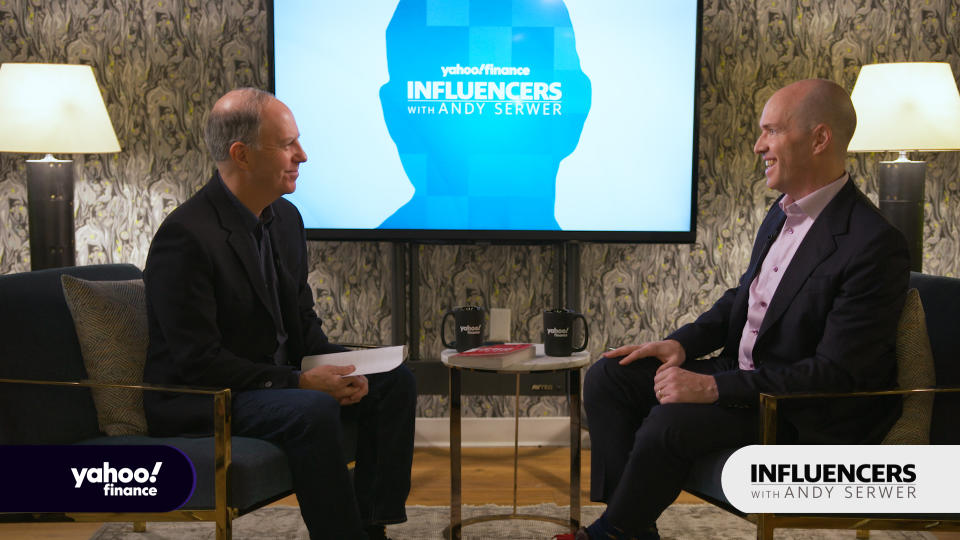Amazon and Apple have different but effective work cultures, venture capitalist says
When Amazon (AMZN) and Apple (AAPL) put out different smart-home devices or streaming services, often only one can win. But when the tech giants create differing company cultures that match their respective business strategies, both can be effective, says a top venture capitalist in a newly released interview.
“Amazon has low prices. Apple's got beautiful products. Two different cultures. One's not good and one's not bad,” says Ben Horowitz, who co-founded venture capital firm Andreessen Horowitz and last month released “What You Do Is Who You Are,” a book on how to build an effective company culture.
“What's good for Amazon is not necessarily good for Apple,” he adds.
The cultures of the respective companies reflect their contrasting business strategies, Horowitz told Yahoo Finance Editor-in-Chief Andy Serwer in an interview taped on Nov. 5.
Though Apple was founded in 1976, some 18 years before Amazon, both rose to prominence in the 1990s and 2000s — the former in Cupertino, California, and the latter up the coast in Seattle, Washington.
“Amazon — known for their frugality,” he says. “They used to famously have you get a door as your desk on some two-by-fours.”
“Apple would never do that,” he adds. “But Amazon's strategy is to be the low cost leader. Apple’s strategy is to have the most beautiful, high-design products in the world. So Apple's got $2,000 doorknobs, probably, on their campus and a $5 billion campus.”
In recent years, the work cultures at the tech giants have drawn scrutiny.
The environment at Amazon’s headquarters was the subject of an investigation by The New York Times in 2015, which portrayed a cut-throat mentality that fostered competition between employees and unforgiving management tactics.
Jay Carney, then a senior vice president for global corporate affairs at Amazon, responded to The New York Times investigation with a Medium post that accused the newspaper of leaving out crucial information and failing to vet sources. “When there are two sides of a story, a reader deserves to know them both,” he wrote. “Why did the Times choose not to follow standard practice here?”
In July, a group of 13 members of Congress — including Vermont Senator Bernie Sanders and New York Congresswoman Alexandria Ocasio-Cortez — sent a letter to the U.S. Department of Labor asking it to investigate the harsh working conditions at Amazon warehouses nationwide.
Amazon responded to the letter, saying “The allegations outlined in this letter are not an accurate portrayal of activities in our buildings.”
In 2016, leaked emails published by Mic showed complaints from female Apple employees detailing alleged sexual harassment and a toxic workplace. Soon after, Apple investigated the allegations and took disciplinary action, the details of which remained private. “We take these things not just seriously, but personally,” Denise Young Smith, then Apple’s HR chief, told Recode.
Chinese factories that manufacture iPhones, run by supplier Foxconn, have drawn attention over the past decade for low wages and worker suicides. In September, Apple responded to a report from advocacy group China Labor Watch that found a failure to compensate workers at a Foxconn factory, saying Apple had found “all workers are being compensated fairly” and “no evidence of forced labor.”
Horowitz made the comments during a conversation that aired in an episode of Yahoo Finance’s “Influencers with Andy Serwer,” a weekly interview series with leaders in business, politics, and entertainment.
He co-founded the buzzy venture capital firm Andreessen Horowitz, which manages $10 billion in assets. Before that, he co-launched a data storage company called Loudcloud, later renamed Opsware, which sold to Hewlett-Packard (HPE) for $1.6 billion.
In 2014, he released “The Hard Thing About Hard Things: Building a Business When There Are No Easy Answers,” a best-selling book on how to run a startup.

Horowitz elaborates on the story of Amazon’s use of doors as makeshift desks in his new book “What You Do Is Who You are.”
“Desks at Amazon were built by buying cheap doors from Home Depot and nailing legs to them,” he writes.
“These door desks are not great ergonomically, nor do they fit with Amazon.com’s $860+ billion market capitalization, but when a shocked new employee asked why she had to work at a makeshift desk, the answer pinged back with illuminating consistency: ‘We look for every opportunity to save money so we can deliver the best products for the lowest cost.’”
In his new book, Horowitz also describes the culture-setting departure and return of late Apple founder Steve Jobs, who resigned from the company amid a management dispute in 1985 and came back as interim chief executive in 1997.
“When Steve Jobs came back to Apple, it was ninety days from insolvency,” Horowitz writes. “As of this writing, it is the most valuable company in the world.”
Jobs narrowed the range of products sold by the company and focused on optimizing the user experience of each one, returning the brand to its prior emphasis on product design, Horowitz writes.
“When Apple was an industry joke, it must have been tempting to purge the old culture entirely,” Horowitz adds. “Jobs, the former founder, knew that Apple’s original strengths should be the foundation of its new mission.”
Max Zahn is a reporter for Yahoo Finance. Find him on twitter @MaxZahn_.
Read more:
